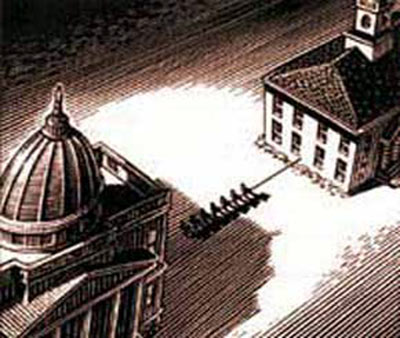
One aspect of Monday's Supreme Court refusal to hear an appeal of same-sex marriage laws is clear: for now, same-sex couples must be allowed to marry in 11 more states.
Less clear, however, is what the decision will mean for religious nonprofits and businesses whose owners claim to follow religious principles in opposing same-sex marriage.
Churches, synagogues, mosques and other congregations remain free to solemnize those marriages they wish to endorse, and can set their own standards for clergy and employees. But whether and how religious-affiliated schools, charities, fraternal organizations or individual believers in businesses must accommodate same-sex nuptials remains unknown, particularly in states without nondiscrimination laws that address sexual orientation.
"These kinds of organizations could face a threat to their tax exempt status should they seek to uphold their religious teachings in relation to employee or student sexual choices and conduct," said Nicholas Miller, an attorney and director of the International Religious Liberty Institute at Andrews University.
These questions came closer to the surface Monday when the justices decided to reject the appeals from five states that had appealed circuit court rulings that found gay marriage bans in those states unconstitutional. The court's decision also expanded those federal circuit rulings to six other states within the jurisdiction of each circuit. In all, 30 states and the District of Columbia will permit same-sex marriage.
PROTECTIONS LACKING
Some religious freedoms have been incorporated in several states where same-sex marriage became legal at the ballot box or by the legislature. In Connecticut, where lawmakers redefined the definition of marriage in 2009, the bill included protections for religious organizations and even the insurance-sales arm of the Knights of Columbus, a Roman Catholic fraternal organization.
By contrast, when the Supreme Court rejects appeals of lower court rulings, the justice weigh "the controversy at hand," said Robin Fretwell Wilson, a law professor at the University of Illinois Law School in Champaign, without deciding any ancillary questions.
Judicial decisions mean "the kinds of protections that may be put in place by state legislatures for those who adhere to a traditional view of marriage are not put in place," Wilson added. "Nothing says a legislature cannot follow on with legislation to do that (now), but many will not be willing to spend (political) capital" on such a move.
And supporters of gay marriage don't have any incentive to negotiate exemptions to same-sex marriage laws since the momentum has swung dramatically in their favor.
"We support current federal constitutional law, which provides that those who enter the marketplace to sell goods or services, or to rent space, to members of the general public are all subject to the same rules," said Jon W. Davidson, legal director for gay rights advocacy law firm Lambda Legal. "We see no reason to grant special rights to some businesses to be exempt from the laws governing everyone else, and certainly not to have a special right to discriminate against same-sex couples, but not anyone else."
But it's not entirely clear whether a group or individual would be violating the law by not serving a same-sex couple.
Consider the Commonwealth of Virginia, one of the states affected by the high court's decision. Marriage licenses can be issued to same-sex couples, but Virginia's anti-discrimination statute says nothing about sexual orientation or same-sex nuptials, said Wilson. A same-sex couple might be able to get a marriage license but still be refused service at a religiously linked catering hall.
According to Ira C. Lupu, a George Washington University law professor in Washington, D.C., it is clear that local and state workers involved in administration of civil marriage will have to comply with rulings that validate same-sex marriage. If a county clerk refuses to grant a same-sex marriage license on the basis of his or her beliefs, Lupu added, "that would be a lawsuit."
But, he added, private businesses, including wedding vendors, would be bound by public accommodations laws. "It'll be culturally unpleasant" for some firms to discriminate, but not illegal unless the state law explicitly specifies it.
"If the Knights of Columbus rent their banquet hall to anyone, and all of a sudden they say 'no, not you' — the first question is would that be unlawful under the state's public accommodations law," Lupu said. "If it's not illegal, there would be no legal consequence, but rather a social consequence."
Until state lawmakers address religious freedom protections under nondiscrimination or same-sex marriage laws, Christiana Holcomb, litigation counsel for the Alliance Defending Freedom in Phoenix, said both religiously affiliated organizations and business owners can best protect themselves by "highlighting their religious identity and beliefs."
Such highlighting, she said, should come in an organization's "governing documents, practices and presentation to the community as a whole."
PRESSURE TO CONFORM
Miller, a professor at Andrews University, a Seventh-day Adventist institution in Berrien Springs, Michigan, suggests the Supreme Court's current endorsement of lower court decisions will increase pressure to support same-sex marriage in many sectors of society.
"Once gay marital status is given the standing of a fundamental right of society, it becomes a bedrock value that community organizations will oppose only with some penalty," he said.
But Davidson said the group isn't hunting up lawsuit targets. Instead, he said, "what we're seeking is for people to be able to go about their daily lives and not encounter discrimination and not be stigmatized because they're different."
He said that even in states where sexual orientation is not explicitly protected by law, a more general claim of sex discrimination might be sustained. "The EEOC said (recently) if employer treats married same-sex couples differently than different-sex couples in terms of benefits, it's sex discrimination under Title VII," he said.
Comment by clicking here.



 Contact The Editor
Contact The Editor
 Articles By This Author
Articles By This Author